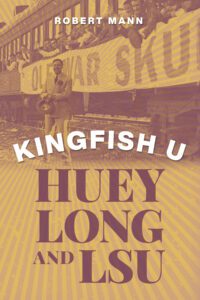Huey P. Long’s relationship to LSU is the subject of new release ‘Kingfish U’
After two years of construction, LSU’s Huey P. Long Field House has reclaimed its place at the center of the campus life.
While there are bridges—and previously a medical center—that honor the legacy of Kingfish, the LSU landmark is now the only historic building that still bears the name of Louisiana’s larger-than-life governor who took a personal interest in the development of LSU.
In the 1930s, Huey P. Long doubled the university’s faculty and facilities. As its enrollment grew exponentially, its ranking in size skyrocketed from 88th in the country to 20th. Subsequently, LSU advanced from Class C school to a Class A school.
That relationship between the governor and the state university is now the subject of Kingfish U: Huey Long and LSU by Robert Mann, the Manship chair in journalism at the LSU’s Manship School of Mass Communication, and the author of numerous books including Becoming Ronald Reagan: The Rise of a Conservative Icon and Backrooms and Bayous: My Life in Louisiana Politics.

Along with improving LSU’s academic reputation, Mann delves into Long’s belief that the football program and band were crucial to LSU’s success. The book chronicles Long’s involvement on the gridiron, which included delivering pep talks, devising plays and firing coaches. The governor also poured money into a larger, flashier band, supervised the hiring of directors and even wrote a new fight song, “Touchdown for LSU.”
Mann also explains that not everything was football and fanfare: Long insisted that no faculty member criticize him publicly. When students or faculty from LSU opposed him, retribution came with severe consequences. And, ultimately, the governor’s unrelenting involvement almost cost the university its accreditation.
While it illuminates the intersection of politics and higher education during the Long era, Kingfish U is an entertaining read with colorful anecdotes packed into chapters with titles such as “I Don’t Fool Around With Losers,” “The Whangdoodle” and “What Does the Band Think?”
True to his Share Our Wealth Plan’s emphasis on making college more affordable in the midst of the Depression, Long transformed the lives of many Louisianans by giving them the education to create generational wealth and—in doing so—cemented a statewide affinity for LSU.
“The history of LSU is the history of Louisiana’s growth,” Mann explained in a Louisiana Insider podcast in June 2023. “[Huey P. Long and LSU] did it through football, the band, making it a better university than it had been a few years earlier and making it an aspiration for young people all over the state to come here.”












